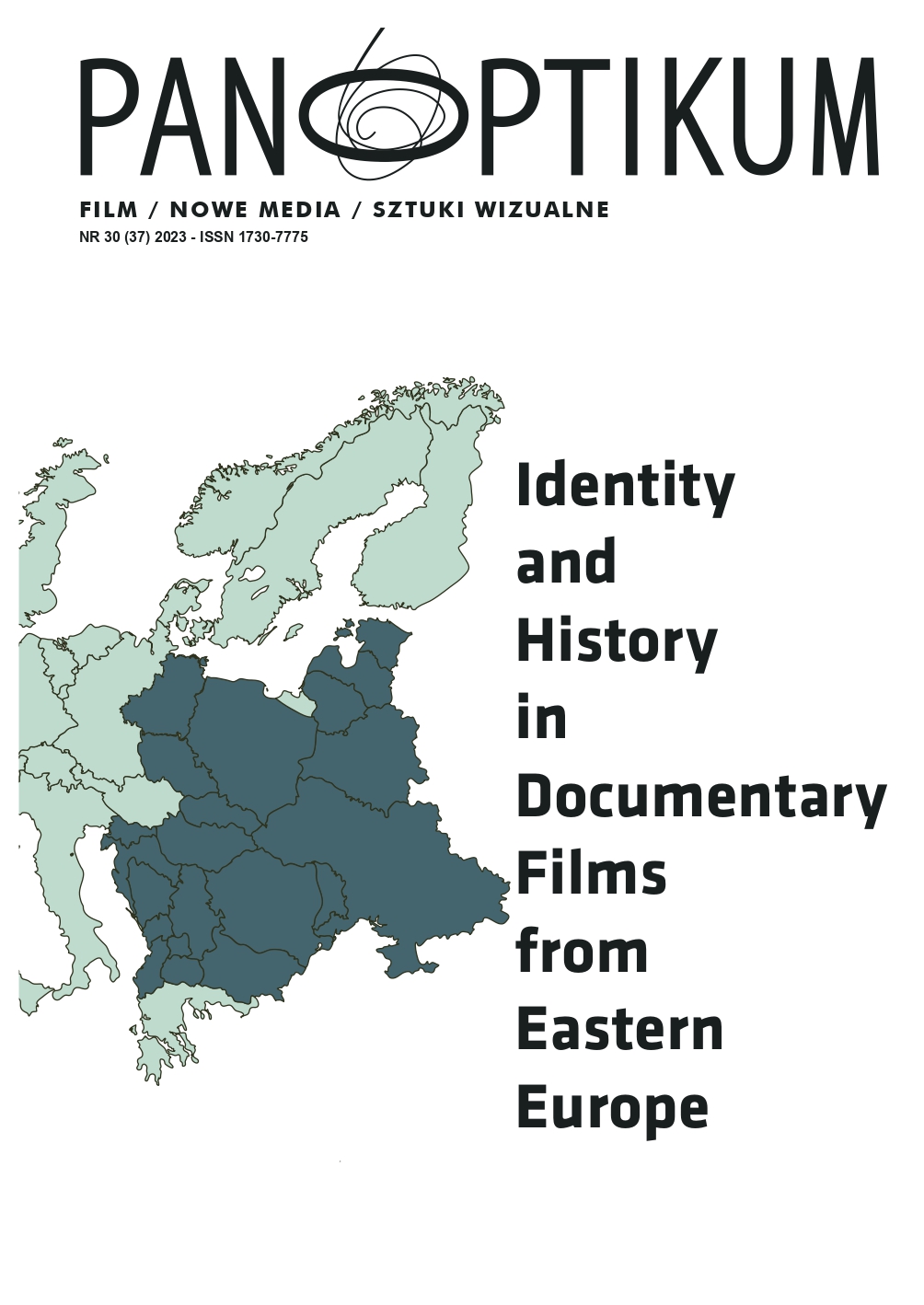History in Lithuanian Women’s Creative Documentaries: Critical and Personal Approach
DOI:
https://doi.org/10.26881/pan.2023.30.07Słowa kluczowe:
History, memory, Lithuanian documentary, female filmmakers, creative documentaryAbstrakt
Over the last two decades, documentary has become an important tool of communication for Lithuanian women filmmakers since their number and visibility on national and international screens has grown significantly. Better gender balance in documentary-filmmaking noticeably increased the exposure to greater stylistic and thematic diversity, as well as paved the way for the new cinematic approaches to national and world history, politics, warfare, collective identity, and other issues traditionally assigned to men. This article examines creative documentaries directed by Giedrė Žickytė, Jūratė Samulionytė and Vilma Samulionytė, Martina Jablonskytė and Ramunė Rakauskaitė. First, it investigates how these films combine subjective, analytical, and critical approaches to examine and mediate complex phenomena in Lithuanian history. Second, it discusses how these women documentarists engage with the past and in what ways their approaches and languages differ from conventional historical documentaries.
Downloads
Bibliografia
Ahmed S. (2004). The Cultural Politics of Emotion, Edinburgh University Press.
Ahmed S. (2014). The Cultural Politics of Emotion, The Second Edition. Edinburgh University Press.
Alter, N. M. (2002). Projecting History: German Non-fiction Cinema 1967-2000. The University of Michigan Press.
Alter, Nora M. (2018). The Essay Film After Fact and Fiction, Columbia University Press.
Alter, N. M. (ed.); Corrigan, T. (ed.). (2017). Essays on the Essay Film. Columbia University Press.
Arlauskaitė, N. (2020). Nuožmi taika: žlugusių režimų fotografija dokumentiniame kine. Vilniaus universiteto leidykla: Vilnius.
Assmann, J. (2008). Communicative and Cultural Memory, in: Cultural Memory Studies. An International and Interdisciplinary Handbook, Astrid Erll; Ansgar Nünning (eds.), De Gruyter: Berlin, New York, pp. 109–118.
Assmann, A. (2008). Transformations between History and Memory. Social Research, No. 1, pp. 49–72.
Bell. D. (2011). Documentary Film and the Poetics of History, “Journal of Media Practice”, 12:1, pp. 3-25.
Bondebjerg, Ib. (2014). Documentary and Cognitive Theory: Narrative, Emotion and Memory. “Media and Communication”, 2 (1), pp. 13–22.
Bondebjerg, Ib. (2014). Cosmopolitan Narratives: Documentary and the Global ‘Other’. “Nordicom Review”, 35 Special Issue, pp. 53-63.
Bondebjerg, Ib. (2020). Screening Twentieth Century Europe: Television, History, Memory. Palgrave Macmillan.
Boris, E.; Chaudhuri, N. (1999). Introduction: Standpoints on Hard Ground, in: Voices of Women Historians: The Personal, The Political, The Professional, Nupur Chaudhuri; Eileen Boris (eds), Indiana University Press, pp. xi-xx.
Brunow, D. (2015). Remediating transcultural memory: documentary filmmaking as archival intervention, De Gruyter.
Chapman, J. (2009). Issues in Contemporary Documentary. Polity Press.
Cook, P. (1981). The Point of Self-expression in Avant-garde Film. In Theories of Authorship. John Caughie (ed.), British Film Institute: London, pp. 271 – 281.
De Groot, J. (2009). Consuming History. Historians and Heritage in Contemporary Popular Culture. Routledge.
Fox, A. (2011). Jane Campion: Authorship and Personal Cinema, Indiana University Press.
Helke S. (2016). In Pursuit of Emotions: the Emotive Turn and Postpolitical Sentiment in Finnish Documentary Film Culture, “Studies in Documentary Film”, 10:2, pp. 183-197.
Hjort M. (ed.) and MacKenzie S. (ed.). (2000). Cinema and Nation. London: Routledge.
Kortti, J. (2016). Finnish History Documentaries as History Culture, “Studies in Documentary Film”, vol. 10, NO. 2, pp. 130–144.
Kortti J. (2022) War, Transgenerational Memory and Documentary Film: Mediated and Institutional Memory in Historical Culture, “Rethinking History”, 26:1, 93-112. Vol. 10, NO. 2, pp. 130–144.
Kurz, I. (2008). Film i historia. Antologia. Wydawnictwa Uniwersytetu Warszawskiego: Warszawa.
Kaminskaitė-Jančorienė, L. (2011). Kaip mes žaidėme revoliuciją. Praryta antis, arba Kaip mes kuriame / atsimename istoriją “Kinas”, 11.23 https://www.zurnalaskinas.lt/musu- kinas/2011-12-01/Kaip-mes-zaideme-revoliucija (Accessed on July 10, 2020).
Laurinavičius, Č.; Sirutavičius, V. (2008). Lietuvos istorija (XII tomas, I dalis). Sąjūdis: nuo “Persitvarkymo“ iki Kovo 11-osios. Baltos lankos: Vilnius.
MacDonald, S. (2013). American Ethnographic Film and Personal Documentary: The Cambridge Turn, University of California Press.
McLane, B. A. (2012). A New History of Documentary Film, Continuum.
Mazierska, E. (2011). European Cinema and Intertextuality. History, Memory and Politics. New York: Palgrave Macmillan.
Mažeikis, G. (2016). Pogulaginė sąmonė ir atžangos dialektika. “Darbai ir dienos”. Vol. 65. Vytauto Didžiojo universiteto leidykla: Kaunas, pp. 55–86.
Mikonis-Railienė, A. (ed.); Šukaitytė, R. (ed.); Martišius, M.; Stonytė, R. (2020). Politinis lūžis ekrane: (po)komunistinė transformacija Lietuvos dokumentiniame kine, videokronikoje ir televizijoje. Vilniaus universiteto leidykla: Vilnius.
Nichols, B. (2010). Engaging Cinema: An Introduction to Film Studies. W. W. Norton & Co: New York.
Nichols, B. (1991). Representing Reality: Issues and Concepts in Documentary, Indiana University Press: Bloomington.
Nye J. (1990). Bound to Lead: The Changing Nature of American Power. Basic Books: New York.
Rascaroli, L. (2009). The Personal Camera. Subjective Cinema and the Essay Film. Wallflower Press: London; New York.
Rosenstone, R. A. (2006). History on film/film on history. Pearson Education Limited.
Rosenstone, R. A. (2018). History on film/film on history. Routledge: New York.
Schwartz, V. R. (2008). Film and History, in: J. Donald; M. Renov (eds). The SAGE Handbook of Film Studies, SAGE Publications, pp. 199-215.
Schwartz, V.R., (2013). Film and History, “Histoire@Politique. Politique, culture, société”, n° 19, janvier-avril, 2013 [en ligne, www.histoire-politique.fr].
Simone, P. (2019) Female directors in European cinema. Key figures. European Audiovisual Observatory, https://rm.coe.int/female-directors-in-european-cinema-key-figures- 2019/16809842b9.
Simone, P. (2022). Female professionals in European film production. 2022 edition. European Audiovisual Observatory. https://rm.coe.int/female-professionals-in-european- film-production-2022-edition-p-simone/1680a886c5.
Smaill, B. (2010). The Documentary. Politics, Emotion, Culture. Basingstoke: Palgrave Macmillan.
Šukaitytė, R. (2005). Moteris su kamera – naujas matymas, nauji identitetai / A Woman with a Camera: New Vision, New Identities, in: Lytys, medijos, masinė kultūra / Gender, Media and Ma, No. 5 (Dec.), pp. 1193-1199.

 Uniwersyteckie Czasopisma Naukowe
Uniwersyteckie Czasopisma Naukowe









